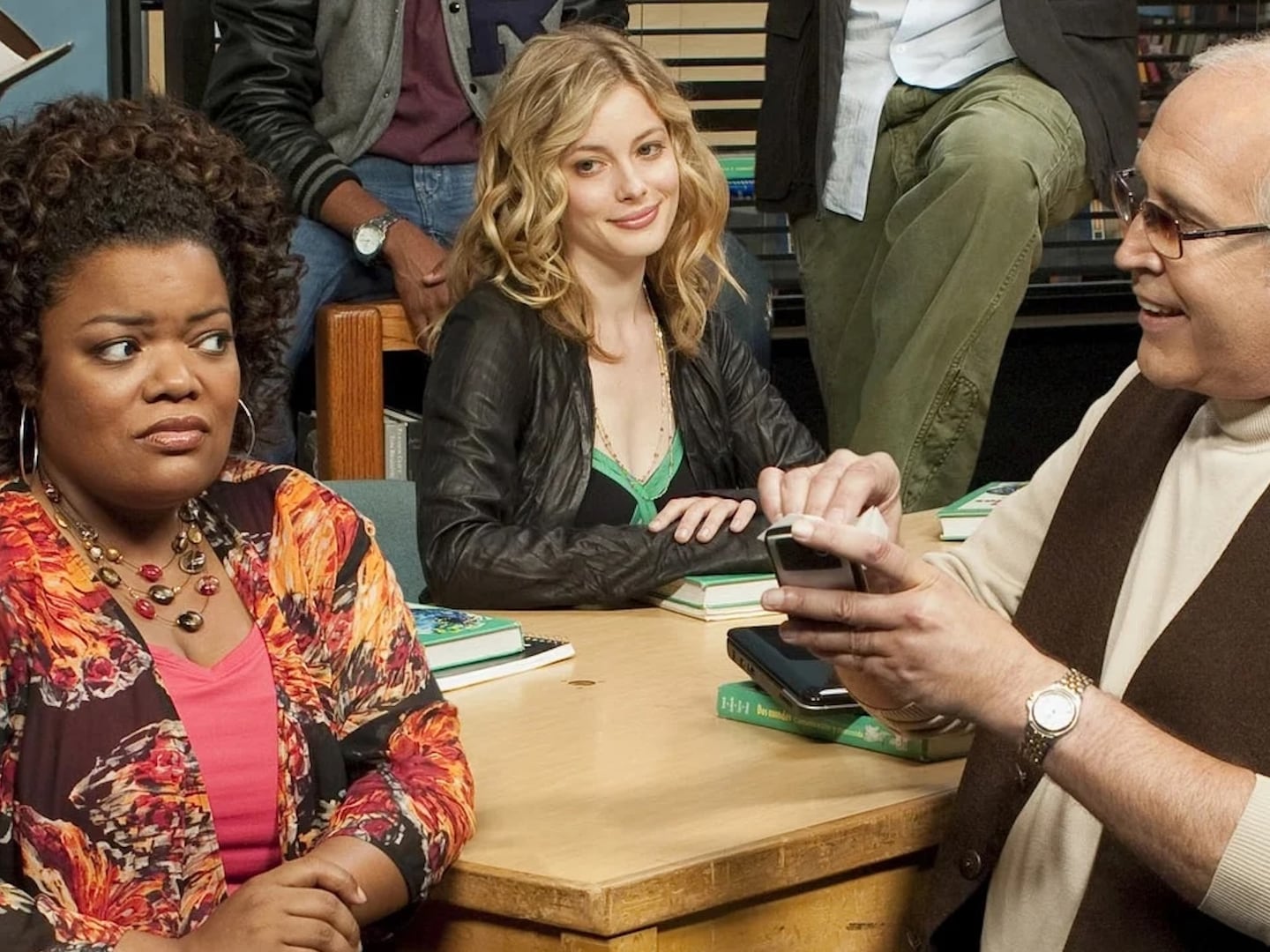When the lights went up at SXSW’s world premiere screening of Julio Torres’ directorial debut, Problemista, viewers were already fluttering out of their seats before the post-credits applause ended. But not because they were anxious to exit the theater—far from it, in fact.
Audience members were champing at the bit to ask Torres and the impeccable cast questions about the film they just saw, which was, to say the least, quite unlike any other. Those thoughts proved difficult to articulate for the nervous audience members at the microphone during the post-screening Q&A. But one response from the cast seemed to define Torres’ indescribable ride with divine wisdom.
Leave it to Tilda Swinton—who stars alongside Torres in the film—to be the sage. The two actors were asked what shape they felt like after the premiere (a nod to Torres’ HBO comedy special, My Favorite Shapes). Swinton took the mic and said with supreme confidence: “Pure color, no shape.”
That might also be the best way to describe Problemista. From the first 10 minutes, it’s gleefully apparent that the film will not fit into any box, no matter how twisted or mangled its frame might become as viewers try to compress its multitude of oddities into a tidy package.
Problemista takes pride in those small, but countless peculiarities. But it’s not with a sneer of arrogance. Rather, Torres and Problemista function as extensions of one another, elevating Torres’ singular eye for the details of life’s microscopic dramas, blowing them up onto the silver screen. In Problemista, Torres and Swinton excavate the forgotten, terribly funny beauty of transience, finding the joy and fantasy in the strangest gift of all: being alive.
Torres, a former SNL writer responsible for strange bits like “Melania Moments” and “Papyrus,” and the creator and star of the HBO comedy Los Espookys, has crafted a niche for idiosyncratic and highly confident comedy. Whether he’s using props he made himself from craft stores or just sending up the hidden humor in culture’s biggest talking points, Torres approaches his craft with an assured, calming confidence that instantly brings outsiders in on the joke.
Those familiar with his work will be happy to see and hear his blissfully unusual style make the jump to his screenplay. In Problemista’s opening scene, a young Alejandro (Torres) frolics in an idyllic, curiously shaped playground in El Salvador, designed by his loving mother, Dolores (Catalina Saavedra). Suggesting additions to his mother, he proposes a large mirror, “So I can see what I’ve become.”
It’s the kind of joke that feels warm to audiences who know Torres’ style and to those just getting a crash course. The line wouldn’t feel out of place in My Favorite Shapes or Torres’ beloved SNL sketch, “Wells for Boys.” This is, after all, the comedian who suggests new animals for zoos, including a swan with a neck so long it has to drag its head behind it, because “beauty is a curse.” Torres has always had a knack for welcoming strangers into his oeuvre with no hesitation, and Problemista is no different.
Ironically, Alejandro doesn’t sport that same confidence. As an adult, he moved to New York City to try to be a toy designer, pitching Hasbro on his eccentric but inspired ideas. While he waits indefinitely for their call (he’s forever perplexed by the void of the company’s automatic “noreply” email address), he takes a job at a cryo-freezing company to maintain his work visa.
Alejandro is put in charge of watching over the cryo chamber of Bobby (RZA), a brilliant artist who chose to freeze his body upon finding out he was terminally ill, hoping to come back healthy in the future. But the future is a long way away, and cryo freezing is an expensive biz—especially since every dollar is going into actually trying to find a way to defrost these people one day.
The scientific logistics of cryonics don’t actually matter, but Torres’ screenplay treats all of its impossible scenarios with complete earnestness. Minute details of the everyday make far more sense to Alejandro than any of the corporate officialness of the world around him. When he screws up at the cryo company one measly time, he’s ousted immediately, threatening his work visa—and his dreams of one day creating his bizarre toys for Hasbro. Suddenly, Alejandro’s life and aspirations are thwarted by the United States immigration system’s bureaucratic red tape, and a clock is ticking for him to get a new visa sponsor before being forced to leave the country.
Enter Elizabeth (Swinton), a Hawaiian Punch-haired, erratic art critic and Bobby’s former lover. Elizabeth quickly pulls Alejandro into her vibrational orbit, suggesting that he freelance as her assistant. His job will be to help Elizabeth with everything from archiving Bobby’s work—13 highly misunderstood paintings of eggs—to listening to her constant, unwarranted frustration with her hordes of Apple products.
In one extraordinary, breathless sequence, Elizabeth hunts for a picture of her begonias on her iPad, scrolling and tapping at headlong pace while prattling on about how she can never find her photos. It’s absurdity heightened to the nth degree, but never feels gratuitous, thanks to Swinton’s ability to dole out delectable mania. I’m not sure I’ve laughed quite so hard this year as I did when Elizabeth, in an attempt to find her begonia shots, zooms in so far on a photo of a bird that you can only see the black of its eyes, as if the flowers will be hidden in the pixels of its pupils.
But Problemista doesn’t solely trade in eccentricities. There’s an aura of true compassion that develops between Alejandro and Elizabeth. They see each other and bond as two empathetic souls, just trying to work out how to love and live at the same time without losing it all. Of course, it’s hysterical to see Swinton traipsing around New York City in floor-length green leather coats, or be fooled by Alejandro’s insistence that he knows how to use FileMaker Pro—an antiquated organizational program she’s hilariously preoccupied with. It’s when Problemista finds that splendor in its two characters’ mutual brands of silliness that the film becomes much more than just the most oddball buddy comedy ever made. It’s often sincerely moving, implying that there is so much to be grateful for when we find people who understand us.
As Alejandro and Elizabeth figure out their dynamic, Problemista slyly broadens its scope, presenting a poignant tale of the inconceivable hurdles of the American immigration system. Though it does this in some of the most cunningly comedic ways possible, Torres’ screenplay is not afraid to hang bleak realities before an audience, dressed as jokes for the most effective gutpunch possible. After all, Problemista is firmly a film about identity, and how so much of our individual ideas of self-worth are tied to dreams kept firmly out of reach by the powers that be. What makes the film so exceedingly satisfying is seeing how Alejandro confronts these obstacles, so that he can take pleasure in the mundanity of life that most of us never have to think about.
Considering these themes, some viewers may be inclined to think Torres has written Swinton’s character as a sort of “Karen” prototype, seen through the eyes of an immigrant. Following the premiere of the film, Swinton was careful to correct an audience member who suggested that the archetype could be applied to Elizabeth. “A Karen is an insider, and Elizabeth is an outsider. That’s the love story, these two outsiders.”
Though Swinton was referring to her and Torres’ characters, you could say Problemista’s secondary love story is the one that is so clearly felt between its stars. Torres and Swinton are two defining voices of indelible wackiness in separate generations. Together, they share a reciprocal understanding that this film creates a space to celebrate all of the things they’ve become revered for. At the heart of all that zaniness is a zest for life, and all of its tiny, problematic, impediments that stop us in our tracks, only to lead us to something indescribable.
Liked this review? Sign up to get our weekly See Skip newsletter every Tuesday and find out what new shows and movies are worth watching, and which aren’t.






